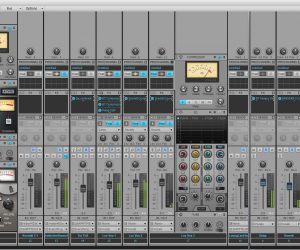
Review: Arturia Minilab MK II
Let’s face it — in today’s world, $150 won’t buy you much. You could fritter that away on the callout fee for a plumber to unclog your kitchen pipes, or by staying three minutes over time in a CBD parking spot.
With a street price of $150, Arturia’s MiniLab Mk II is among the most wallet-friendly impulse purchases I’d actually recommend. Mostly because it’ll give you a whole lot more than $150-worth of enjoyment. In my opinion, a decent set of black and white keys is satisfactory for that kind of asking price, so anything over and above that is a welcome bonus.
Arturia has a knack for creating delicious-looking products. Who else is gonna bookend a utilitarian MIDI controller with wood panels? Sure, it’s fake wood, but who cares. Connections are minimal. No old-school MIDI connectors, just USB and a sustain pedal port. The MiniLab supports iOS too, so you can use it with your favourite apps.
MINI & MIGHTY
Laptops are amazing things. Thanks to these portable powerhouses we can make music just about anywhere. The USB bus-powered MiniLab is absolute perfection when combined with a laptop and a change in scenery from your home studio. It’s small, lightweight, yet has enough playing surface and expressive control to feel like you can bash out a tune without tactile impediment.
Two octaves of mini keys doesn’t sound like much — and it isn’t if you’re wrestling with a fugue — but it’s fine for noodling with synth leads or playing a MIDI drum kit. The spirit of these little keyboards is portability and spontaneity. Got an idea? Run to your MiniLab and lay it down quick. Better yet, shove it in a backpack and jam it out with a friend. It sure beats loading a heavyweight 88-note digital piano into the boot, and you don’t sacrifice a huge amount of functionality.
The 16 knobs are plenty for most virtual instrument applications and the first pair can be used as push buttons, an update over the original. The eight rubber pads now feature multi-coloured backlighting, feel sturdy and responsive, and a button toggles the pads between numbers 1-8 and 9-16.
You can cycle through MIDI channels 1-16 by pressing the Shift button and the corresponding ‘ivory’. This was super handy when playing around in Native Instruments Kontakt — jumping between sampled instruments was as easy as pressing Shift and selecting the MIDI channel the patch was set to receive on. A bit like having 16 fader layers on a console.
The Pitch and Mod wheels are the same ribbon slider type found on Arturia’s KeyStep. I’m a fan, but it may take a bit of adjusting if you’ve only used wheels.
NEED TO KNOW
Arturia Minilab MK II
Midi Controller

KEYS TO THE MAP
Ableton Live Lite is bundled with the MiniLab along with Arturia’s own Analog Lab Lite, containing a collection of keyboards with over 500 presets to get you going. MiniLab has a trick up its sleeve; all its hardware controls are pre-mapped for tight integration with Analog Lab Lite from the moment you open the instrument. The first clickable knob lets you browse and select presets, the second lets you select filters, while the rest are auto-assigned to tweak the instrument’s sound parameters. Even the pads have their own functions — for example the sixth clears all filters, and the seventh and eighth pads let you move to the previous or next patch, respectively. The final goody in the bag is UVI’s Piano Model D, a multi-sampled Steinway instrument.
GOES EVERYWHERE
The MiniLab isn’t designed to replace your larger, studio workhorse keyboard controller with full-sized keys. It’s small for a reason, and that’s to inspire creativity in places you can’t or couldn’t be bothered transporting your chunkier gear too. If you do any kind of production, EDM, or virtual instrument work and don’t have a little buddy like it, MiniLab is for you.
At this price point, the fact that it’s got pads, knobs, and sliders is impressive enough. I’m not an impulse purchase kinda guy, but with the MiniLab I’ll make an exception. Grab one if you need keys, pads and knobs cheap.
















RESPONSES